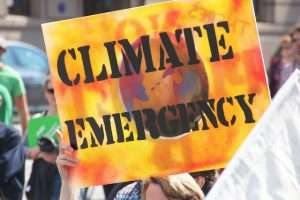Using 'real life' analogies to get past scientific uncertainty on climate change

Many people still treat global warming as a contentious political issue, instead of one backed by scientific consensus. For example, in a recent Pew survey, only 48% of all US adults agreed that the Earth is warming mostly due to human activity. This finding is frustrating to many science communicators, who may feel that they've bombarded the public with messages of human-caused global warming, to no avail. At first, it may seem like many US adults have somehow missed out on these warnings that global warming is a serious threat, one requiring urgent actions, but research has begun to reveal that instead of simply communicating more about global warming, it's important to reconsider how we're communicating—particularly when it comes to galvanizing support for public policy changes.
A recent paper published in PLOS ONE, The Promise and Limitations of Using Analogies to Improve Decision-Relevant Understanding of Climate Change, suggests that analogies comparing climate change to issues people are more familiar with can help them recognize features of climate change that can guide decisions for reasoning about it. The researchers, Kaitlin Raimi, Paul Stern, and Alexander Maki, tested the effects of 3 different analogies: one that compared global warming to a medical situation, another to a natural disaster, and the third to a courtroom trial.
Participants read just one of these analogies, and were asked how helpful the information had been. People who had received one of these analogies rated the information as more helpful than people who had received the same kind of information without an analogy. first, it may seem like many US adults have somehow missed out on these warnings that global warming is a serious threat, but research has begun to reveal that instead of simply communicating more about global warming, it's important to reconsider how we're communicating.
For encouraging people to consider the causes and consequences of global, the medical analogy was the most helpful. Consider these similarities between climate change and medical diseases:
- Risks are often caused or aggravated by human behavior.
- Processes are often progressive.
- Produce symptoms outside the normal range of past experience.
- Uncertainties in prognosis of future events.
- Treatment often involves trade offs, or side-effects.
- Most effective approach is often to treat the underlying problem, instead of just alleviating symptoms.
- Hard to reverse.
Compared to people who read about the courtroom or natural disaster or no analogy at all, people who read the comparison of climate change to a medical disease agreed more with statements like the following:
- Climate change will get worse if we don't do something about it
- Climate change is hard to reverse
- Climate change may cause catastrophes, such as storms, floods, and wildfires greater than ever seen before
- The things that people do that cause climate change also promote human comfort and convenience
They also found that endorsement of these analogy-suggested statements was especially strong for conservatives, whose tendency to believe that global warming is happening appears to have caught up with dominant US public opinion – notably, even a near majority of Trump voters—but who tend to disbelieve the scientific consensus that human activity is its major cause, as shown in this detail from the Pew election-year survey.
L

This work provides a promising alternative for helping people think about climate change as an issue that requires decision making under uncertainty. Most people are already familiar with the consequences of many diseases—for example, we often know that someone has a disease, why they have it, and the likely symptoms, but we may not necessarily know exactly how much they'll be affected or when. In this work, when an analogy encouraged people to draw connections between their background knowledge of medical diseases and global warming, they had a framework to fit the otherwise abstract and seemingly controversial idea of climate change into, which helped them think about the necessity of making decisions.
Weighing study limitations
These results are encouraging, but we should also take them with a grain of salt. In a second experiment designed to replicate the first, the medical analogy didn't seem as effective as it did the first time in encouraging people to consider the urgency of making decisions to minimize global warming. Similarly, conservatives were no longer the ones who changed their views more as a result of reading the medical analogy; this time the liberal participants did (though combining the data from the two studies suggested that conservatives indeed did experience a larger opinion shift as a result of the analogy). In general, the medical analogy decreased the partisan polarization in climate change beliefs, generally facilitating consideration of the importance of addressing climate change among more skeptical participants.
There were also other measures that we might have hoped the medical analogy would improve, but it didn't: for example, people were not more likely to endorse pro-environmental policy changes after reading the medical analogy than no analogy. Thus, the effect of the medical analogy for thinking about global warming seems to be a weak one, only helpful for thinking about some aspects of the issue. It does not yet seem that we've found the panacea for communicating this urgent topic, but this work provides a promising next step for communication efforts and further research.
We invite readers to share analogies that have been helpful (or hurtful!) for discussing the sensitive topic of climate change.
Journal information: PLoS ONE
Provided by Public Library of Science
This story is republished courtesy of PLOS Blogs: blogs.plos.org.



















